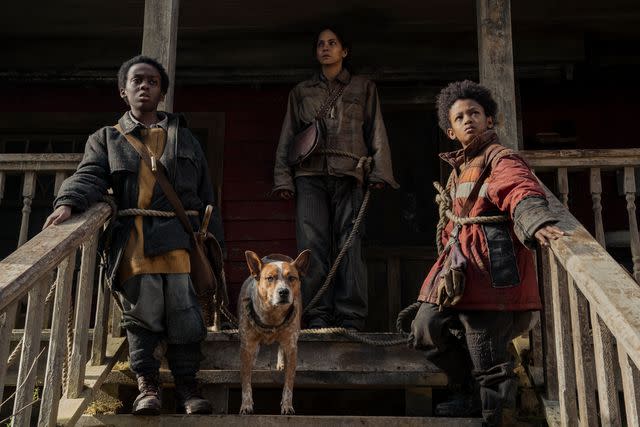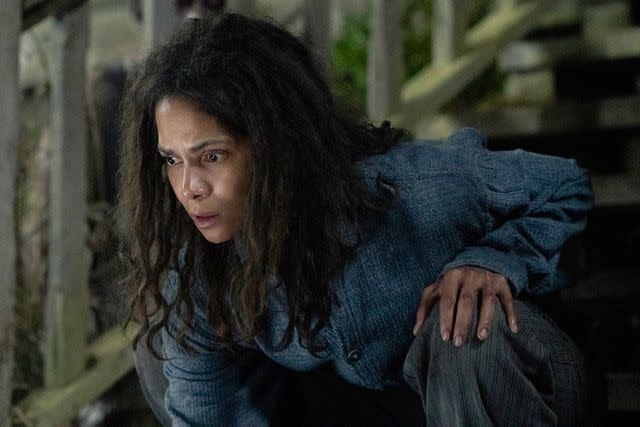“Never Let Go” director Alexandre Aja untangles the film’s ambiguous, fiery ending — and the 'real fight' he put up for it

The filmmaker behind “The Hills Have Eyes” and “Crawl” answers EW's burning questions about his latest psychological horror starring Halle Berry, Anthony B. Jenkins, and Percy Daggs IV.
Warning: This article contains spoilers from Never Let Go.
In Never Let Go, the ties that bind tear a family apart.
French filmmaker Alexandre Aja's psychological horror, in theaters now, stars Halle Berry as a character known only as Momma, a mother caring for her sons Samuel (Anthony B. Jenkins) and Nolan (Percy Daggs IV) in a remote cabin in the woods. The home has been their safe haven for the last decade, after what Momma refers to as the Evil ravaged the world. When they forage the surrounding woods for food, they tether themselves to the cabin with rope for protection and promise to “never let go.”
What at first presents itself as a survival horror, though, slowly unknots itself with twists and turns. When the food runs low, Nolan begins to question if the Evil is real. Once the ties that bind are severed, everything comes into question — including the mental state of Berry’s troubled matriarch. Is there a tangible Evil out there? Or is it merely a manifestation of deep-seated generational trauma now passed down to the boys?
“I think the Evil is as real as you think it is,” Aja tells Entertainment Weekly. He’s hesitant to share his own analysis of the ending, pointing to multiple audience interpretations. “The movie has so many layers." At the core is a tale about a mother and her sons. “One of them believes everything she's saying, and the other one is questioning and doubting.”
Okay, but what was that creature, then? Was the hiker's daughter real? Aja answers all of that and more below.
Want more movie news? Sign up for Entertainment Weekly's free newsletter to get the latest trailers, celebrity interviews, film reviews, and more.

Liane Hentscher
Anthony B. Jenkins as Samuel, Halle Berry as Momma, and Percy Daggs IV as Nolan in 'Never Let Go'ENTERTAINMENT WEEKLY: To kill off the Halle Berry during the movie’s halfway point was bold. Was there a back-and-forth about that?
ALEXANDRE AJA: It was in the script from the beginning. I had the chance to discover it as an audience member and be surprised. At some point, we had a conversation about what the story would be if that didn't happen, but we never actually wrote it. We always stuck to our instinct. That was a great turn and twist in the story, so we were really embracing it from the beginning.
Diving into the ending and Samuel’s fate, what’s the deal with the creepy hand on his shoulder in the Polaroid?
For me, the movie is a fairytale. It is a story told through images, and every image has an involvement. But for me, the presence of that evil hand on his shoulder is just to say he is f---ed up. He will never get rid of that trauma, like his brother, by embracing the darkness of his mom. In the end, one is going to be safe. The other one will never manage to get free and will always be on that rope.
Was the hiker’s daughter he encountered real or a figment of his imagination?
She is completely a figment of his imagination. This is where the script was so smart because it plays with your expectations. When the hiker shows up, the instinct is, oh, the Evil is not real. And then when the little girl shows up, you're like, oh, okay, she's real as well. But then it's like… what? In the middle of the night, she walked miles? And then you have that moment right before where Samuel is looking at the picture of the hiker with his daughter and she's dressed exactly the same way that she's going to show up. One of my favorite shots in the movie that is very subtle is during that scene where [Samuel is] lighting her face with the flashlight, and she's asking in a very candid, naive, caring way, “What's the rope around your waist?” And he says, “To protect me.” She took a step toward him and said, “To protect you from what?” This moment is the most dreadful moment for me because I know exactly at that point that he's really facing his own darkness and his own Evil.

Liane Hentscher
Halle Berry as Momma in 'Never Let Go'At the beginning of the movie, Nolan thinks he hears Samuel say “she loves me more” about Momma, which is also the film’s closing line. What’s the significance of that?
For me, it's clear that Samuel didn't say it in the first place. But somehow it's the subtext, or the tension, that's between those two brothers. And by the end when he says that, he's definitely still under the influence of his own evil and darkness. [It's] one of the expressions of that trauma that came from his grandma to his mother to himself.
What were some of the references for creating the demon that Nolan battles? It was white and slimy, and quite unexpected.
That was a snake reference. The first line of the movie is, “First it came to Momma as a snake,” and that was the first moment where she was kind of confronting the Evil. So the snake motif is definitely something that's here throughout the movie, that monster coming out of skin. When we see grandma and grandpa, there is that snake skin that you see under the human flesh. The key of the movie for me was that moment in that cellar where Nolan is fighting the Evil that came out of his mother’s skin. At some point he is taking her in his arms and holding her tight and saying, “I love you, Momma.” And by embracing her, the demon crumbles and disappears. That was the key, the center of the movie. Everything was building to this moment.
Related: Halle Berry learned how to skin a squirrel for upcoming thriller Never Let Go
What do you think the future holds for the brothers after their rescue?
I think Nolan is free. When he says, “We are free,” I think he is. I think he did the work. He managed to embrace the darkness of his family and everything that happened, and he's really cutting the rope and leaving everything behind. I feel he's going to hopefully try to save his brother from his own demons later on, but he's actually free. There were a lot of conversations about this ending, about should we have another ending? It was at some point a real fight for me as a filmmaker to maintain this version of the movie. And I have to say that without Halle, I will have maybe not succeeded because both of us shared that vision from the beginning. I couldn't imagine another ending where Nolan was not free and Samuel was not still under the influence.
This interview has been edited for length and clarity.
Read the original article on Entertainment Weekly.

 Yahoo Lifestyle
Yahoo Lifestyle 
